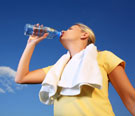Fluid Balance is Critical to Health and Performance
 Maintaining proper fluid balance is essential for every athlete since small levels of dehydration can negatively impact performance. Not getting enough fluids, high humidity or environmental temperature can interfere with the body’s ability to maintain a normal temperature. This can lead to heat-related illness and death. During most activities, adequate water intake can help prevent dehydration and heat exhaustion. However, during endurance events or activities greater than 60 minutes, a sports drink with carbohydrates provides fuel for the nervous and muscular systems, and may enhance performance. During multiple daily workouts and very long endurance events (e.g. ultra marathon) in which sweat losses are high, carbohydrate and electrolyte (e.g. sodium, potassium) intake is required
Maintaining proper fluid balance is essential for every athlete since small levels of dehydration can negatively impact performance. Not getting enough fluids, high humidity or environmental temperature can interfere with the body’s ability to maintain a normal temperature. This can lead to heat-related illness and death. During most activities, adequate water intake can help prevent dehydration and heat exhaustion. However, during endurance events or activities greater than 60 minutes, a sports drink with carbohydrates provides fuel for the nervous and muscular systems, and may enhance performance. During multiple daily workouts and very long endurance events (e.g. ultra marathon) in which sweat losses are high, carbohydrate and electrolyte (e.g. sodium, potassium) intake is required
General Fluid Requirements:
- Fluids should be cold, palatable and selected based on the type and duration of the activity.
- Sports drinks should contain four to eight percent carbohydrate. Drinks greater than 10 percent carbohydrate may slow stomach emptying, cause abdominal cramping and impair performance.
- Drinks with a combination of glucose, glucose polymers and fructose may enhance water absorption.
- Solutions containing primarily fructose can cause an upset stomach and should be avoided. Be sure to check the food label for ingredients.
Pre-exercise Guidelines
- Drink approximately 16 to 24 ounces of fluid two hours before activity.
- On warm or humid days, drink an additional eight to 16 ounces 30 to 60 minutes before activity.
- Water is adequate for activities less than an hour as long as meals are consumed regularly.
- For endurance events, training sessions longer than 60 minutes, or multiple practices a day, choose a sports drink containing four to eight percent carbohydrate (e.g. Gatorade)
- For early morning workouts, a liquid meal replacement can be consumed 10 to 40 minutes before activity because it can be rapidly digested.
During Exercise
- Depending on your sport, consume three to six fluid ounces of water or sports drink every 15 minutes. This equates to approximately 32 ounces per hour.
- For prolonged exercise greater than 4 hours, choose a sports drink with small amounts of electrolytes.
Post-exercise Guidelines
- Immediately following activity, drink at least 16 to 20 ounces of fluid for every pound of weight lost to ensure proper rehydration.
- A liquid shake with high carbohydrate content, minimal protein and fat can refuel energy stores and maximize recovery after demanding training bouts. Consume this as soon as possible after workouts or events. The dotFIT Pre/Post Workout & Meal Replacement Formula contains the ideal blend of nutrients.
- Drink an additional 16 ounces with your post workout meal. This meal should be consumed within two hours after activity.
- Weigh yourself each morning. A stable weight generally indicates proper fluid balance.
Signs and Symptoms of Dehydration
It’s very important to be able to recognize the signs and symptoms of dehydration (listed here) to prevent illness and injury. Be sure to learn these and if you experience any of them, stop exercise and rehydrate adequately.
- Thirst
- Dry mouth/cotton mouth
- Headaches or lightheadedness
- Fatigue or weakness
- Muscle cramps
- Nausea and vomiting
- Flushing (red) skin
- Dry skin (sweating stops)
For guidelines on proper hydration for youth see, "Proper Hydation for Youth Athletes".
References
- American College of Sports Medicine, Sawka MN, Burke LM, Eichner ER, Maughan RJ, Montain SJ, Stachenfeld NS. American College of Sports Medicine position stand. Exercise and fluid replacement. Med Sci Sports Exerc. 2007 Feb;39(2):377-90. Review.